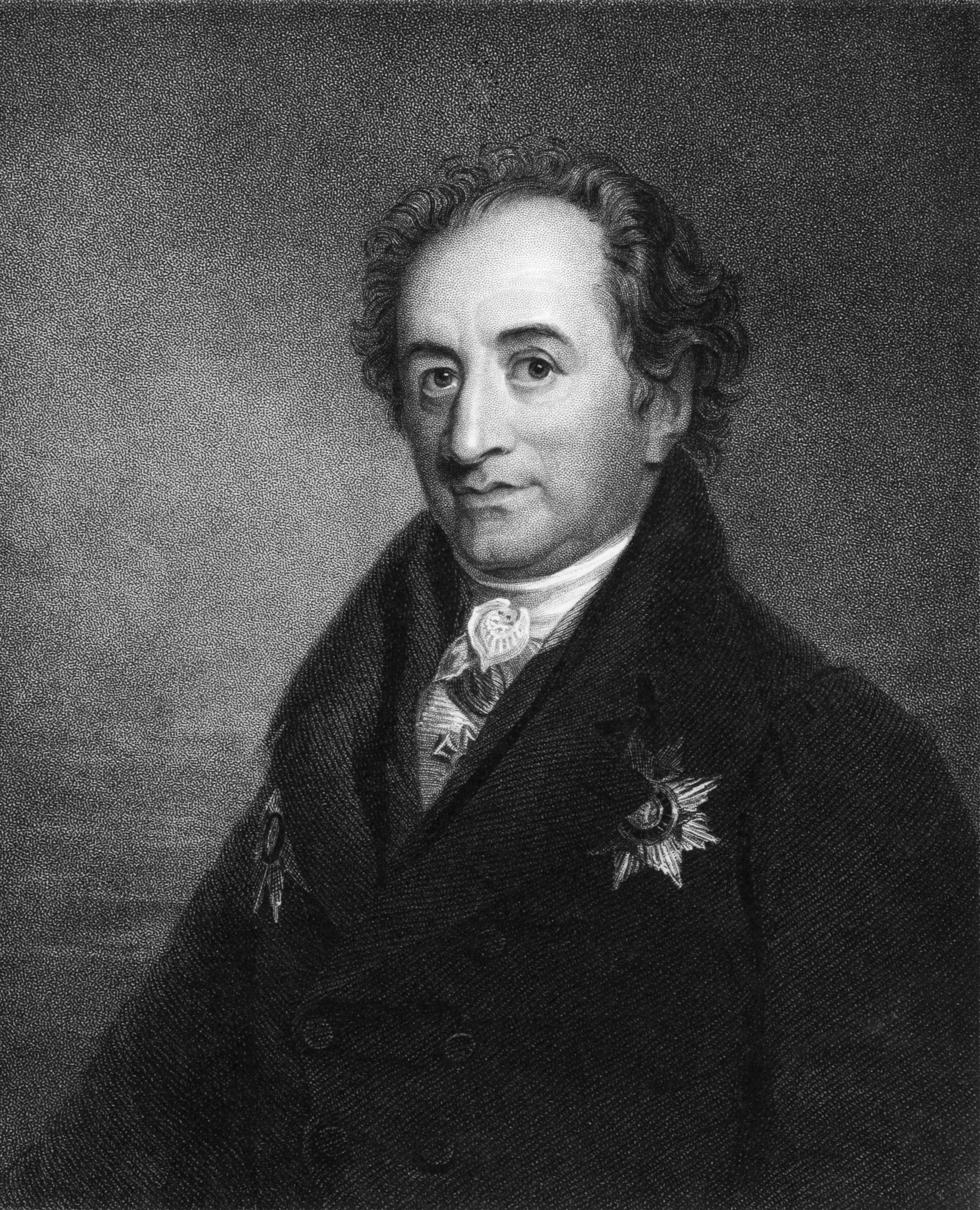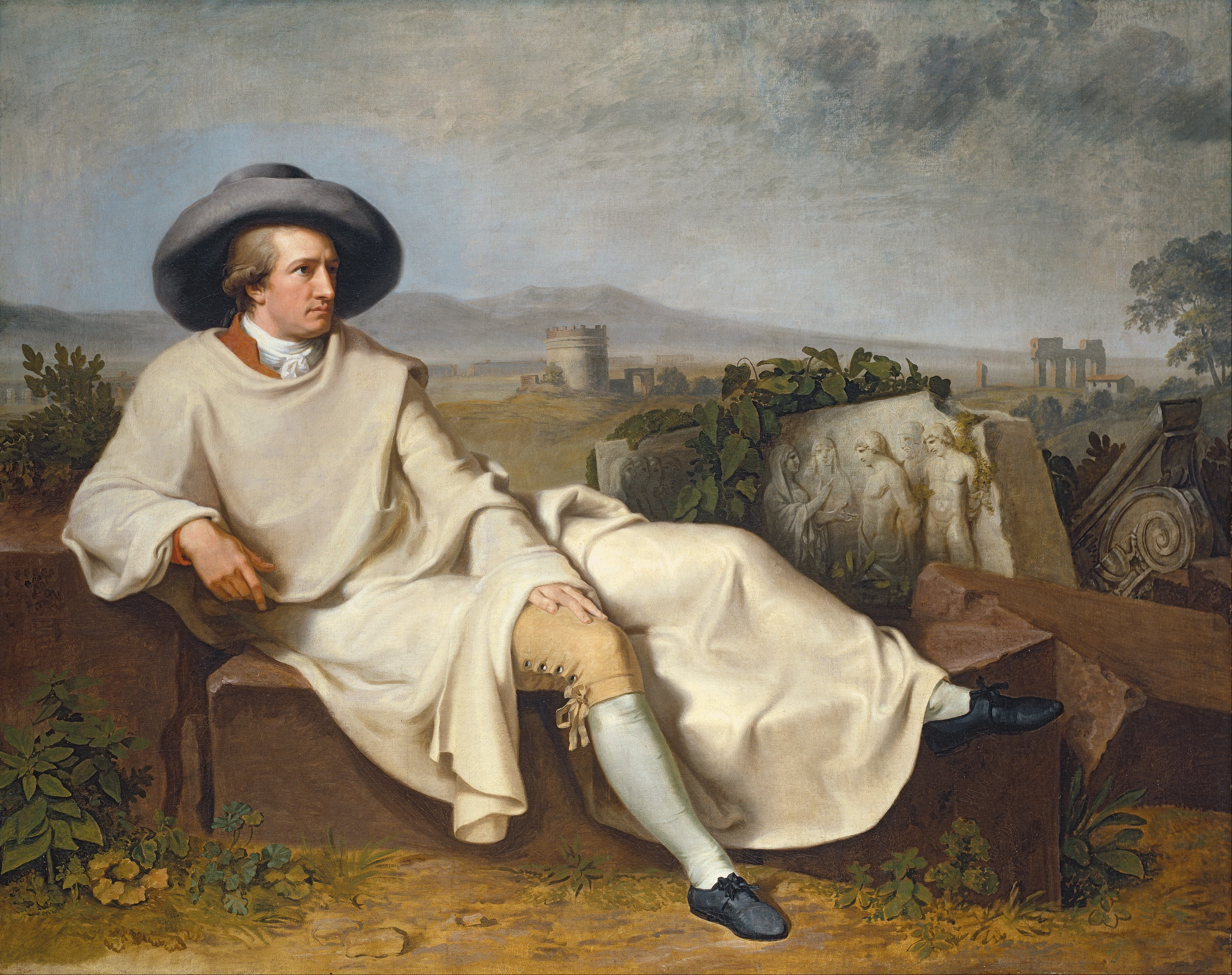Goethe, Johann Wolfgang von << GUR tuh, YOH hahn VOHLF gahng fuhn >> (1749-1832), was a German poet, novelist, and playwright. He ranks among the most important and influential writers of modern European literature. His masterpiece is the verse play Faust (see Faust ). Goethe was also a leading thinker and scientist. The scope and originality of his literary works and the diversity of his intellectual pursuits make him the central figure of German Classical and Romantic literature.
Early years.
Goethe was born on Aug. 28, 1749, in Frankfurt (am Main) into a well-to-do family. He received an excellent education, which stressed foreign languages, literature, and fine arts. While studying law in Leipzig from 1765 to 1768, Goethe wrote gallant and playful poems. A physical breakdown forced him to return to Frankfurt in 1768. After his recovery, he completed his law studies in Strasbourg in 1770 and 1771. While in Strasbourg, he wrote the Sesenheimer Lieder, his first significant poetry. This collection of highly personal and unconventional love lyrics was inspired by his love for a pastor’s daughter from nearby Sesenheim.


Goethe met the philosopher Johann Gottfried Herder at Strasbourg. Goethe was deeply impressed by Herder’s enthusiasm for nature, his understanding of history, and his opposition to rationalism and artificiality in literature. Herder stimulated Goethe’s interest in ballads and Volkslieder (folk poetry), and in Homer, Shakespeare, and Gothic architecture. Under Herder’s influence, Goethe came to regard naturalness, sincerity, and simplicity as the prime virtues of all art.
After Goethe returned to Frankfurt, he wrote his first successful play, Gotz von Berlichingen (1771, revised 1773). The play describes a nobleman’s tragic fight for freedom and justice within a corrupt social system during the Reformation. The young German writers of the Storm and Stress movement praised it, and used it as a model for their own works. See German literature (German Preromanticism) (German Classicism) .
The Sorrows of Young Werther (1774, revised 1787) made young Goethe famous throughout Europe. It is a novel written in the form of letters. The work is the story of a sensitive and uncompromising youth who commits suicide after being torn by uncontrollable passions.
During these fruitful years in Frankfurt, Goethe also produced the original form of Faust, the so-called Urfaust. In addition, he wrote several satires, plays, and love poems. He also wrote philosophic hymns on art, nature, and the mission of the poetic genius.
Middle years.
In 1775, Goethe moved to the Duchy of Weimar, southwest of Leipzig, to assume an administrative post in the government of Duke Karl August. Weimar was Goethe’s home for the rest of his life. His work there involved such diverse fields as agriculture, mining, military affairs, and finance. In addition, Goethe took an increasing interest in scientific studies, especially in geology, mineralogy, botany, and zoology.
The outstanding achievement of Goethe’s early Weimar years consists of several nature and love poems. The calm and serene beauty of these poems contrasts with the irrational tone of his earlier works. Influenced by the intellectual companionship of Charlotte von Stein, Goethe learned to discipline his passions and he developed a greater balance between emotion and reason.
To free himself from routine chores and find fresh artistic stimulation, Goethe lived in Italy from 1786 to 1788. While studying ancient art, he searched for his own classical ideal of art and life. To Goethe, this ideal became a combination of clarity and expressiveness, form and feeling. His autobiographical Italian Journey (1816-1817) mirrors this maturing process. In the Roman Elegies (1788-1790), Goethe’s expression of sensuality and joy in life is controlled by a strict poetic form.
In Rome, Goethe completed Egmont (1788), a play that takes place during the conflict between Spain and the Netherlands in the 1500’s. It tells the tragic story of a trusting, self-confident, and freedom-loving young aristocrat who falls victim to the political scheming of his tyrannical opponents. Iphigenia in Tauris (1787) is a modern version of a Greek myth based on a play by Euripides. It expresses Goethe’s belief in people’s inborn goodness. Human guilt and failure are redeemed through the heroine’s noble character.
After his return to Weimar, Goethe finished Torquato Tasso (1790), a tragedy about a poet who fails to come to terms with his surroundings because of his lack of self-discipline. The novel Wilhelm Meister’s Apprenticeship (1795-1796) shows the gradual, sometimes painful, process by which a young man interested in the arts gains maturity, self-knowledge, and a sense of social responsibility. It is a typical Bildungsroman (a novel about an individual’s educational development). It holds a central position in German fiction, and was much imitated. Goethe emphasized middle-class values in Hermann and Dorothea (1797), an idyllic epic poem set during the French Revolution.
Goethe’s friendship with the dramatist and philosopher Friedrich Schiller, which began in 1794, proved to be extremely stimulating for both writers. They worked together on several projects and exchanged views on life and art in their correspondence. Schiller encouraged Goethe to complete Part I of Faust (1808).
Late years.
By the early 1800’s, Goethe had become Europe’s most celebrated writer. After Schiller died in 1805, Goethe deeply felt a lack of intellectual companionship. In 1807, he married Christiane Vulpius, a girl who had lived in his house since his return from Italy. He spent much of his time on scientific projects. He became director of the Weimar theater.
In 1809, Goethe created Elective Affinities, one of his finest prose works. This novel is a study of the tragic relationship between a married couple and their two friends. Three parts of Goethe’s autobiography, Dichtung und Wahrheit (Poetry and Truth), appeared between 1811 and 1814. The fourth part was published in 1833, after his death. The autobiography vividly describes his life up to 1775. In Wilhelm Meister’s Journeyman Years (1821, revised 1829), Goethe loosely continued the plot of the earlier Wilhelm Meister novel. The second work primarily conveys the author’s views on education, social ethics, and the problems of the coming industrial age.
Goethe completed Faust a few months before his death on March 22, 1832. Faust is a man who desires complete knowledge, unlimited experience of life, and self-perfection. Guided by Mephistopheles, the devil, he moves from one realm of human experience to another without ever attaining full satisfaction. At the end of Part II, Faust is saved by God’s grace in spite of his guilt and pride. The devil loses a wager for Faust’s soul because Faust continually sought perfection.
